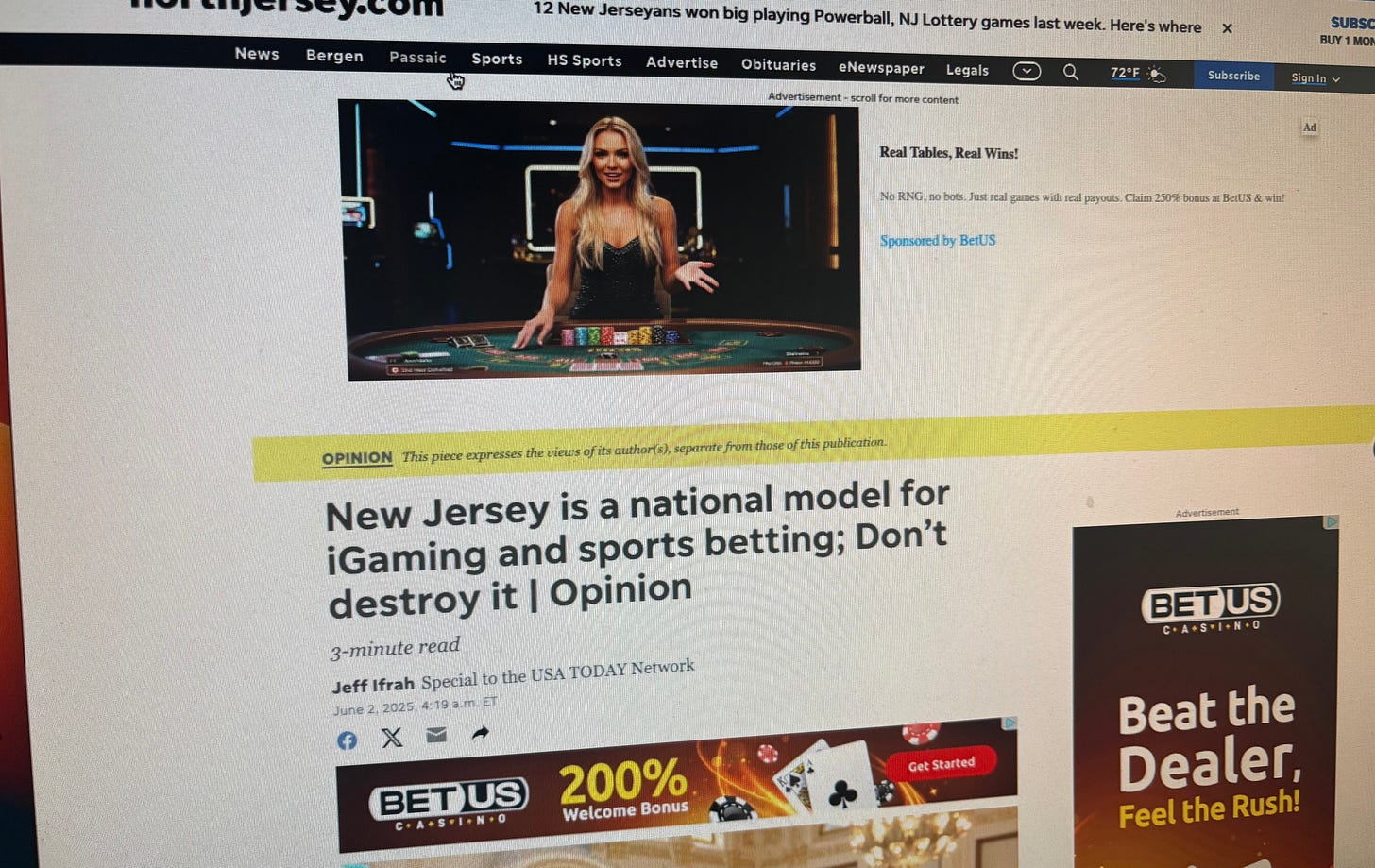The Early Line: Illinois Legislature Passes 25-Cent Tax On Every Sports Bet
State budget still needs governor's approval. Gambling news roundup: The latest on Ohio online casino legalization efforts; ESPN covers Kalshi; VGW owner seeks buyout of other shareholders.
The Early Line offers a look at the top stories heading into the week, along with some analysis.
Illinois Passes New Sports Betting Tax in Middle of the Night (Front Office Sports): “Sports bettors in Illinois on Saturday logged into their apps and were met with an uncommon warning: the state legislature was considering new taxes.
The tax, which passed minutes before midnight local time on Saturday, will be 25 cents for every bet for a licensee’s first 20 million bets, and 50 cents per bet thereafter. This arrangement came as part of $1 billion in new taxes to ostensibly fund public transit, after a new provision last year raised taxes on sportsbooks from a 15% flat fee to up to 40%.”
The budget, if signed by Gov. JB Pritzker, would go into effect July 1.
There’s already been a ton of digital ink on this; a few pieces, quick-hitter style:
Proposed Illinois Tax Hike Wipes $3B Off DraftKings’, Flutter’s Combined Market Cap (InGame)
Analyst: Other States Could Copy New Illinois Sports Betting Tax (Legal Sports Report)
A statement from the Sports Betting Alliance, which represents online sportsbooks operators: “For the second consecutive year, the Illinois legislature chose to balance its budget with a crippling tax on legal online sports betting operators and their million plus Illinois customers — this time with no warning and no consideration of the devastating impact this tax would have on the legal market. Make no mistake, this discriminatory, punitive and constitutionally suspect tax increase on legal sportsbooks who have invested more than a billion dollars in the state will be destabilizing for regulated sports betting in Illinois. A per bet tax most penalizes small recreational bettors — many of whom are betting a single dollar or two. Under this legislation, these popular bets will get hit with a massive 25% or 50% tax on handle. Customers understand that they will be the ones to bear the cost of this new tax. That’s why Illinois customers sent more 76,000 emails and tweets to their representatives asking them to stop this discriminatory tax.”
The Ringer deletes social media post lobbying for FanDuel (Awful Announcing)
Reading the line: Barring news, I’ll dig deeper into this in The Current on Tuesday. But suffice it to say, this is easily one of the dumbest policies I’ve seen around regulated sports betting. And it’s made all the worse by dropping it in the larger state budget without any kind of discussion. If you want to raise taxes? Fine. Do it on revenue, and do it in public. There is a tipping point at which sports betting operators are going to pull out of states because of onerous taxes and regulations. This probably isn’t it, but we’re approaching that day. Why offer regulated sports betting when you could offer a prediction market for sports, or a sweepstakes sportsbook, etc.
This kind of sums it up from Circa Sports’ Jeffrey Benson: “The goal of legalized wagering was to bring bets from offshore grey and black markets into the regulated onshore space yet with every mind boggling decision from both regulators and politicians we continue to seemingly push money back offshore and take massive steps backward. It is simple: provide a good regulated environment for both bookies and bettors to operate and reap the rewards for a fantastic product offering and all the tax benefits/revenue that comes with it. However - greedy, illogical, and uneducated decisions from these folks have forced some sportsbooks out of business or to sweeps, lessened competition, made market access damn near impossible all for some short term tax gains that is going to burn out a lot of the industry and its patrons.”
Trusted Voices: Conversations About Betting is designed to equip adults, including parents and coaches, with tools and resources to talk to young people about gambling, including information on warning signs, risks and proxy betting. The program is led by retired professional basketball player Randy Livingston and his wife, basketball agent Anita Smith, who share their personal stories related to problem gambling, with the hope of preventing others from experiencing similar harms. Learn more and join the conversation here.
Kalshi: Gambling, betting or none of the above?
How Kalshi and prediction markets are disrupting sports betting (ESPN): ‘If courts ultimately sided with Kalshi, it could open the door for a widespread use of sports-based event contracts outside of traditional sportsbook regulation,’ Johnny P. ElHachem, an attorney at Holland & Knight who is an expert in gaming law, told ESPN. ‘For the sports betting industry, I think this presents both a competitive challenge and a regulatory dilemma. Who governs these markets and how they are policed are unresolved questions right now.’”
More Times Kalshi Said You Could Bet On Things: An Update (Event Horizon): “The impetus for this post is two recent LinkedIn posts from CEO Tarek Mansour. He said in a post that he disagrees with the ‘gambling characterization’ of financial markets. But just a few days later, he freely uses the word ‘bet’ in another LinkedIn post. It seems obvious now that Kalshi is trying to draw a line between ‘gambling’ and ‘betting.’ While there may be some nuance between the two words, there’s not a terribly meaningful difference between them in the real world — legally or even in casual usage. After all, the word ‘betting’ is literally in the phrase ’sports betting,’ which everyone will tell you is also gambling, even if there’s some skill involved. ‘Betting’ on things sometimes (but not always) implies skill that might not be present in all forms of gambling, but I am not sure how that helps Kalshi. Of course, you can ‘place a bet’ on a roulette spin or a hand of blackjack. That a sportsbook is the ‘house’ and Kalshi just facilitates trades/bets between two parties is of course a meaningful difference that Kalshi often points to and many of us recognize. ESPN touched on it in a piece this morning. But to say the former is gambling and the latter is somehow not defies most common sense, if not legal definitions.”
Reading the line: At the end of the day, I don’t have a problem with prediction markets for sports existing, if we get actual (gambling) regulation around them, a more transparent regulator in the Commodity Futures Trading Commission, and a laundry list of other things. Chief among those is that everyone stop play-acting that this isn’t gambling/betting and that it doesn’t need to be treated in an equivalent manner. My quote in the ESPN piece sums up my worldview pretty neatly: "There's no doubt that it's gambling. You can argue on the logistics, and whether it's federally legal, all of that. But it's gambling."
Some other prediction markets odds and ends:
The Nevada Resort Association will be allowed to intervene in Kalshi’s lawsuit against Nevada in federal court. More from attorney Dan Wallach.
The Arizona Deparment of Gaming — which had already sent a cease-and-desist to Kalshi — has also sent a letter to the CFTC: “The DCMs claim that, earlier this year, the CFTC allowed their sports outcome contracts to take effect without review or comment. Since then, the CFTC, at the last minute, cancelled a scheduled roundtable to discuss State and Tribal concerns. And, most recently, the CFTC dropped its appeal against Kalshi in the U.S. Court of Appeals for the D.C. Circuit. The CFTC’s inaction in enforcing its own rules, specifically, 17 CFR 40.11(a)(1), has prioritized the private business concerns of a handful of DCMs over the public’s interests. The State respectfully requests that the CFTC reconsider its actions and inaction in light of the State’s concerns and conclude that the DCMs’ offering of event contracts is gambling, is contrary to the public interest, and should be prohibited.”
Closing Line Consulting
Niche research and analysis? Startup advice? Help with your content? I have a consultancy to help clients in gaming and beyond. Learn more about CLC here.
Want to be a sponsor of this newsletter? Email dustin@closinglineconsulting.com.
Gambling news roundup
New Jersey is a national model for iGaming and sports betting; Don’t destroy it | Opinion (NorthJersey.com): “The governor’s proposal would raise the tax rate on sports betting and iGaming from 13% and 15%, respectively, to 25% for each as part of a larger $1 billion tax hike plan that would also increase taxes on recreational pursuits like baseball batting cages; basketball courts; billiard parlors; bowling alleys; bungee jumping; fishing piers; go-cart rides/speedways; golf courses and driving ranges. Both prominent Democrats and Republicans in Trenton have referred to the proposal as a “fun” tax, and with a busy election year that promises a very competitive, open seat race for governor and the entire state Assembly on the ballot, many believe voters won’t be laughing if they have to pay it. As for our members — who run the gamut from small startup companies to well-known major platforms — they’ve set up shop in the state, created jobs here and generated billions of dollars in revenue precisely because of New Jersey’s competitive tax structure and favorable environment for iGaming and sports betting. Any negative changes to that will almost assuredly discourage future growth and could result in some of our members deciding to look at other states who choose to reward, not punish, growing businesses.”
Can’t make this up, I was greeted with Bet.US ads on this piece:
Ohio Governor Notes Potential Online Casino Addiction Issues (Legal Sports Report): Ohio online casino discussions continue, but Gov. Mike DeWine is urging caution to the state’s public and lawmakers. DeWine told a crowd in Cleveland last week that legalizing online casino in Ohio could increase gambling addiction. There are two proposals under consideration in the legislature, SB 197 and HB 298. ‘Just so everybody understands, this would be 24-7,’ DeWine said according to Cleveland.com. ‘Anybody who’s got an iPhone could basically have a casino there. And the potential for addiction is just massive.’”
Nearly All Ohio Type-C Sports Betting Kiosks Will Go Offline in June (Sports Betting Dime): “Just two years after launch, the vast majority of Ohio sports betting kiosks will go offline in the Buckeye State by June 22. The Ohio Lottery recently reported to Sports Betting Dime the largest vendor of the Type-C sports betting kiosks, Intralot’s Sports Bet Ohio brand, will be withdrawing from Ohio entirely by June 22. Aside from just a few remaining locations hosted by UbetOhio, Intralot’s withdrawal will put a near end to Ohio’s sports betting kiosk market, which Sen. Nathan Manning (R-13) recently described as a “colossal failure.”
I was shocked, shocked, I tell you, that Intralot was again a failure at sports betting after how
wellpoorly it did as Washington DC’s monopoly operator.
Escalante to buy out investors in his $3.2b online gambling giant (Australian Financial Review): “Laurence Escalante is seeking to take control of Virtual Gaming Worlds, the online gambling business he founded and turned into a global player, by buying out smaller investors in a deal valuing the company at $3.2 billion. Escalante already owns 70 per cent of Virtual Gaming Worlds, and has grown his fortune by pioneering the use of a loophole in regulations in the United States that allows the company to deliver poker machine-style gambling to millions of Americans, initially on Facebook.”
It’s certainly interesting timing for this as the company behind Chumba Casino and Global Poker has faced legislative and regulatory pushback and is now backing a trade group to represent its interests in the US.
High 5 Games Regains Connecticut B2B License Following Review, Reinforces Commitment to Legal Sweepstakes Model and Regulatory Integrity (press release): “High 5 Games announced the reinstatement of its gaming license in Connecticut following a regulatory review by the Connecticut Department of Consumer Protection (DCP). The company cooperated fully throughout the process and remains firmly committed to compliance, player safety, and regulatory transparency in every market it serves. With 30 years of industry leadership and a global audience of millions of slot players, High 5 Games has consistently maintained that its sweepstakes-based model is lawful under both state and federal guidelines. At no point during this process was the company found to have violated any laws. ‘We respect the Department of Consumer Protection and the important work they do to uphold the integrity of Connecticut’s gaming market,’ said Tony Singer, CEO of High 5 Games. ‘While we may not agree with every interpretation, we have always cooperated fully and acted in good faith. We operate with integrity, within the law, and with deep respect for the licenses we hold.’ Importantly, in January 2025, prior to this regulatory review, High 5 Games had already begun the process of voluntarily exiting all regulated iGaming states, including Connecticut, to reinforce its long term commitment to a compliant, nationwide sweepstakes model. The company had completed its exit from the Connecticut sweepstakes market before this matter was initiated and has no plans to resume operations in the state. High 5 Games continues to hold its license to provide slot content to regulated platforms in Connecticut and maintains active operations in numerous U.S. and international jurisdictions.”
Fanatics secures deal to bring new gaming jobs to the Philippines (SBC Americas): “Fanatics Betting & Gaming is expanding with a business operations deal in the Philippines. The online sports betting and casino operator has landed a partnership with Claymore Solutions to provide gambling-related employment opportunities in the Philippines. Fanatics is working with Claymore to provide back-office support in the Philippines with Claymore being accredited as a Special Class BPO by the Philippine Amusement and Gaming Corporation. … ‘We are excited to access world-class talent to support our operations as we continue our mission to deliver a premier gaming experience for our customers,’ said Fanatics Betting & Gaming CTO Ian Botts.”
SailGP Enters Sports Betting Marketplace Ahead of Mubadala New York Sail Grand Prix (press release): “SailGP has entered the sports betting marketplace globally ahead of this weekend’s Mubadala New York Sail Grand Prix (June 7-8). Betting will be available across a range of operators, including DraftKings in the U.S. and Bet 365 in internationally available territories. SailGP is collaborating with sportsbooks globally to access betting markets for the Rolex SailGP Championship, providing an opportunity to grow the league’s fanbase and increase fan engagement. The global racing championship is working with several data providers and global bookmakers to take its data feed and publish odds to the market. SailGP Managing Director Andrew Thompson said: ‘We are delighted to create additional ways to attract and engage new SailGP fans by entering the sports betting marketplace and also give our existing fans new opportunities to enjoy the racing. SailGP is a sport driven by data, allowing sportsbooks to create odds on the spot at our events across the global championship, and enhance viewing and spectating experience through live betting in a responsible manner.’ SailGP has a strategic integration with Abelson Sports, ensuring comprehensive and accurate odds coverage, and has developed an in-house, self-service odds portal, empowering betting operators with real-time access and control.”
Olympic champion Gabby Thomas followed and heckled by gambler at Grand Slam Track meet (The Guardian): “Three-times Olympic champion Gabby Thomas said she was verbally abused at the Grand Slam Track meet in Philadelphia last weekend, the latest incident of harassment she has reported this year.Thomas, who won gold in the 200m, and 4x100m and 4x400m relays in Paris, said in a post on X that a man followed her around the track shouting insults while she was taking photographs with fans and signing autographs.
Ifrah Law has been at the center of advancing iGaming in the U.S., shaping groundbreaking legislation, leading precedent-setting cases, and guiding clients that span the iGaming ecosystem through every phase of their business journey. Learn more at IfrahLaw.com.











